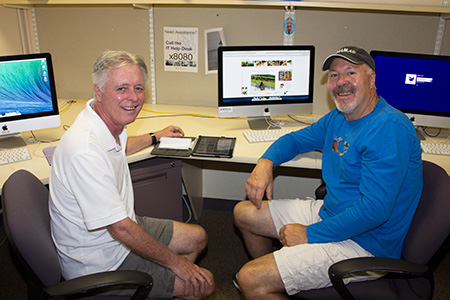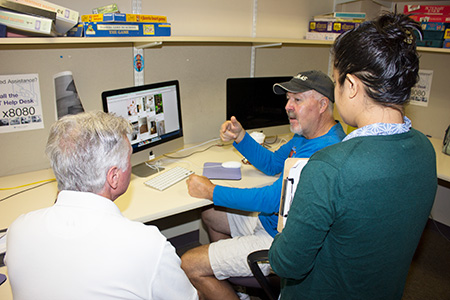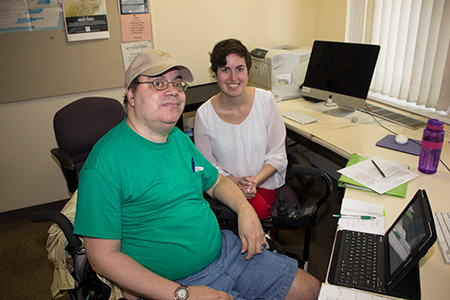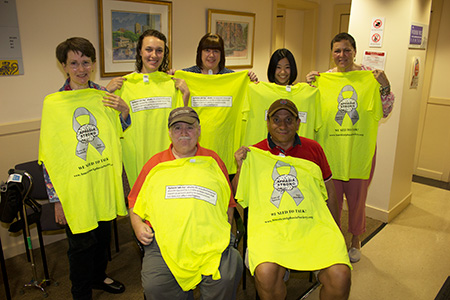Aphasia clients learn Pinterest, Facebook at Emerson

Gary Schwab, 58, and Jeff Carlson, 62, are participants in the Robbins Center’s new Connecting Online group, which teaches people with aphasia how to use social media and online tools to help with quality of life. (Photo by Dan O’Brien)
Many of us have a love-hate relationship with social media or see it as a waste of time, but for people with aphasia—a speech and language disorder that often occurs after stroke or brain injury—it’s a crucial quality-of-life tool in the digital age.
At Emerson, in a new therapy group called Connecting Online, students and faculty in the College’s Robbins Center, in the Communication Sciences and Disorders Department, help aphasia patients develop skills to use social media, email, text messaging, and smartphone apps.
“Working here, I’ve learned there are so many things we take for granted,” said Rea Ramos, MS ’16, a student who works with clients in the group. “Things that are straightforward for us are very difficult for others.”
Jeff Carlson, 62, a plumber who suffered a stroke 10 years ago, learned how to use Pinterest to get ideas and instructions to complete several do-it-yourself projects at his Cape Cod summer home.
“I like this computer class,” Carlson said. “It’s a lot of one-on-one and things I want to do. It’s not telling me what I should do.”
Through learning how to use Pinterest in the Connecting Online group, Carlson built a compost bin out of pallets for his backyard. He also made decorative items using shells from the beach and described making a tiki torch-style decoration for his front porch.
“My wife came home and said, ‘Where did you get that!’ She couldn’t believe it,” he said.

Schwab and Carlson speak with Rea Ramos, MS ’16, who is helping them use Pinterest in the Connecting Online group. (Photo by Dan O’Brien)
Aphasia is not a cognitive impairment but a neurological disorder that affects the ability to speak, write, spell, and read, according to Jena Castro-Casbon, the clinical instructor supervising the Connecting Online group.
“People with aphasia are often isolated due to communication or physical impairments,” Castro-Casbon said. “Through Connecting Online, they’re able to connect with friends and family. They’re able to become more engaged.”
Facebook emoticons, often called emojis, are a focus for Larry Marshall, 58, of Lexington, who has aphasia and is partially paralyzed, requiring the use of a wheelchair.
“Back during our horrible winter, he posted a link to an article on how we were going to break the snowfall record, and he used some very appropriate emojis with crying faces, red exclamation points, and snowflakes,” Castro-Casbon said. “That really helped him clarify his message and how he was feeling.”

Larry Marshall works with Molly Trisler, MS ’16, at the Robbins Center. (Photo by Dan O’Brien)
Marshall also uses an iPad app, Proloquo2Go, which speaks phrases to questions he is commonly asked. For example, if he goes into Dunkin’ Donuts, he can press a button which speaks and displays what he wants, such as, “I would like a plain doughnut.”
“Most of the time Larry can say what he wants,” Castro-Casbon said. “But he uses the computer as a fallback in case the message wasn’t clear.”
Repetition is key in getting aphasia patients to remember how to use social media sites and apps, Castro-Casbon said. Clients are also taught to keep notebooks of words and phrases they commonly use in social interactions.
New aphasia groups at Emerson
Connecting Online is just one of three new therapy groups at Emerson for people with aphasia. Castro-Casbon and Clinical Instructor Laura Glufling-Tham oversee a support group called Living with Aphasia and the Community Outings Group, through which people with aphasia visit local restaurants and businesses to build communication skills.
“The clients have responded very positively to the new groups,” Glufling-Tham said. “Being able to share their thoughts and feelings with other people with aphasia is very powerful.”
Aphasia Awareness Day

Several aphasia clients at the Robbins Center hold T-shirts they, along with Emerson faculty and staff, will wear at Aphasia Awareness Day on June 25. Back row: Martha Soderblom, Victoria Diamond, MS ’16, Clinical Instructor Laura Gulfling-Tham, Ayaka Masumoto, MS ’16, and Wendy Damon. Front row: Paul Carr and Fred Arthur. (Photo by Dan O’Brien)
On Thursday, June 25, about 25 students and faculty from Communication Sciences and Disorders will assemble on the steps of the Massachusetts State House for the annual Aphasia Awareness Day, and will join a group of colleagues from three other Boston institutions that provide aphasia treatment: Boston University, Northeastern University, and the Massachusetts General Hospital’s Institute of Health Professions.
The awareness day will advocate for better insurance-provider funding of aphasia treatment, which often ends after a few months despite it often being a lifelong neurological disorder. Emerson offers treatment on a sliding scale payment system and periodically awards scholarships to clients.
“It’s very important to educate our legislators to improve funding for these services,” Glufling-Tham said. “People who have aphasia often live with it for the rest of their lives.”
Categories